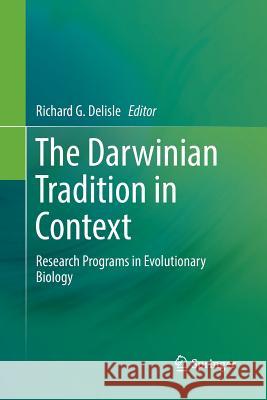The Darwinian Tradition in Context: Research Programs in Evolutionary Biology » książka
topmenu
The Darwinian Tradition in Context: Research Programs in Evolutionary Biology
ISBN-13: 9783319887180 / Angielski / Miękka / 2019 / 352 str.
Kategorie:
Kategorie BISAC:
Wydawca:
Springer
Język:
Angielski
ISBN-13:
9783319887180
Rok wydania:
2019
Wydanie:
Softcover Repri
Ilość stron:
352
Waga:
0.50 kg
Wymiary:
23.39 x 15.6 x 1.91
Oprawa:
Miękka
Wolumenów:
01
Dodatkowe informacje:
Wydanie ilustrowane











